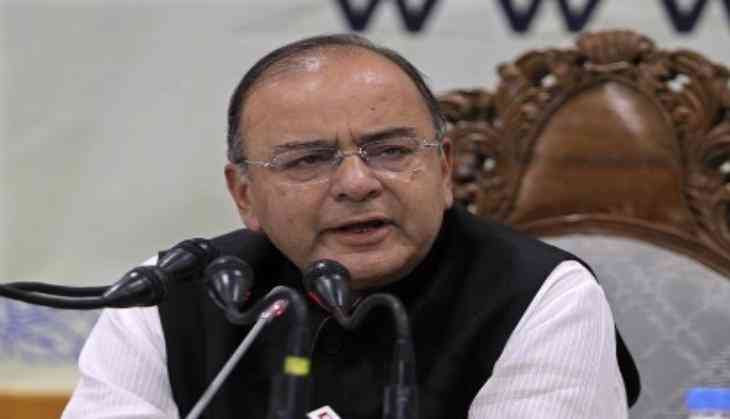
Exporters will get an e-wallet facility and a refund of taxes paid on inputs and shipments as the Goods and Services Tax (GST) Council on Friday eased rules to provide them relief on tax rates.
The decision was taken during the 22nd GST Council meeting, which was chaired by Union Finance Minister Arun Jaitley in New Delhi.
The impact of the GST on trade, small businesses and its transition issues were discussed in the meeting held earlier today and the following decisions were announced by Jaitley on late Friday evening.
Tax relief for exporters:
"The main problem of the exporters that was discussed was that there is no taxation in exports, because when you export, you can't export taxes, because they become non competitive. Exports have to compete globally and that is why, a secretary committee was set up where Central and State officials were present and whose recommendation was considered. This thing came forward that the exporter credit is blocked, due to which cash liquidity is affected, the data of which is technically available.
The immediate refund system is being worked upon and will take some time. It was decided that immediately from October 10, July's and from October 18, August's refund would be processed and would be given to exporters through cheques.
The Committee recommended a long term solution and for now an e-wallet for every exporter will be created. In that e-wallet, a notional amount will be like an advance refund. Through this credit, the product's IGST, GST will be given to the people.
The refund they get will receive eventually, would become an offset through e-wallet. We are working on starting the e-wallet from April 1, 2018.
An appropriate development company will work on it.
Till then exporters' future exports they will become nominal GST, and on top of 0.1 per cent, merchant exporters can export.
This exemption that is being given to them, extending existing advanced authorisation, export promotion, capital goods, EPCG, and 100 per cent EOU, till March 31, 2018.
So, there are three parts, the one that is old, July-August will be refunded immediately.
Future exports that they will do till March 31 will work through that exemption in which the nominal of 0.1 per cent will be given and after that we will work to establish the e-wallet by April 1, 2018."
Hike in composition scheme threshold:
"The composition scheme shall be made available to taxpayers having annual aggregate turnover of up to Rs. 1 crore as compared to the current turnover threshold of Rs. 75 lakh. This scheme includes three kind of people, one who do trading they will give about 1 per cent tax, meaning that if the turnover is of Rs. 1 crore, then they will give about 1 per cent tax.
Those in manufacturing will give about 2 per cent tax and those in restaurants business will give about 5 per cenr. So, the circle of the composition scheme has been increased.
Those who have Rs. 1.5 crore turnover and that will cover about 90 per cent SSCs and are outside the composition scheme, they will file quarterly returns instead of monthly returns.
Those who have more than Rs. 1.5 crore turnover, they, according to the old circle, GST 1, GST 2, GST 3 will file according to that monthly.
Hence, the small and medium tax payers, whose turnover is less than Rs. 1.5 crore, the whole compliance burden has decreased through two ways - that less than one crore will go in composition, which is quarterly and can pay nominal tax.
For example - if someone has a grocery shop, he gives 5 per cent on branded items, but those who sell open atta (wheat), there is zero tax on that. So if the trader gives 1 per cent, whether the exempted goods will come under that category or will stay out.
A Group of Ministers (GoM) shall be constituted to examine measures to make the composition scheme more attractive and will give its reports.
The restaurants - which are of less than Rs. 1 crore turnover and which are bigger than that, that are air conditioned, they take 18 per cent tax; they claim the Investment Tax Credit (ITC), but have they decreased their claim with the ITC. The taxation system of these restaurants will be revisited.
To streamline the working, March 31, 2018 has been deferred for it."
Reduction in GST on few other items:
"The GST on khakra and unbranded namkeen has been reduced from 12 per cent to 5 per cent. The tax on zari work, unbranded ayurveda medicine has been reduced from 12 to 5 per cent.
The GST rate on some stationery items, diesel engine parts has also been reduced to 18 per cent from the earlier 28 per cent.
Sliced dry mangoes - 12 per cent to 5 per cent
Unbranded namkeen - 12 per cent to 5 per cent
Unplanted ayurvedic medicines -12 per cent to 5 per cent
Plastic waste, parings or scrap - 18 per cent to 5 per cent
Rubber waste, parings or scrap - 18 per cent to 5 per cent
Paper waste or scrap - 12 per cent to 5 per cent
Yarn of manmade staple fibers - 18 per cent to 12 per cent
Diesel engine parts - 18 per cent
Pumps part - 28 per cent to 18 per cent
Government jobs involving high element of labour have been changed from 18 per cent to 12 per cent."
The finance minister added that the pattern of collection [of the GST] is not clear after two months, because it was a period of transition.
Prime Minister Narendra Modi, earlier on Wednesday, had also assured that the glitches would be fixed, in an hour-long speech on the Indian Economy.
-ANI


